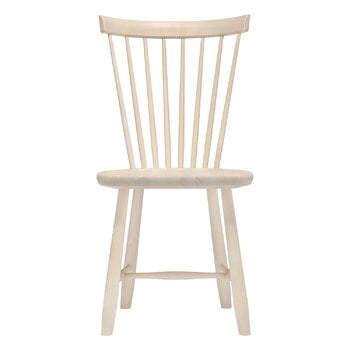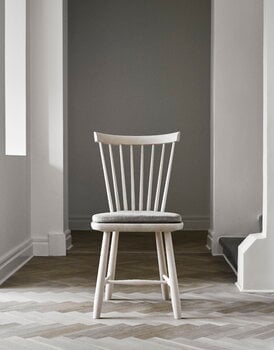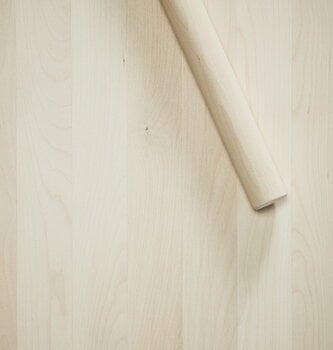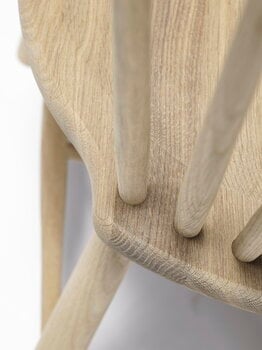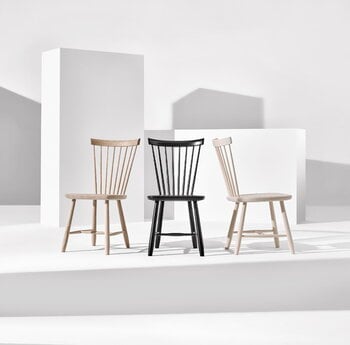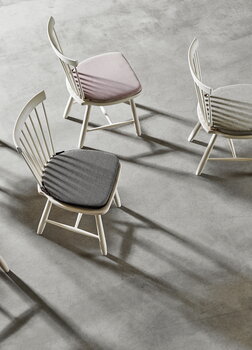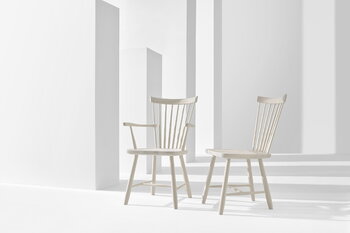Stolab's Lilla Åland chair is a Swedish classic designed by Carl Malmsten in 1942. Malmsten drew up the chair design after his visit to the Finström Church on the Åland island that is located between Sweden and Finland – he was inspired by a stack of stick-back chairs he saw in the church and decided to create his own version of them. The end result was a modern Windsor-style chair named Lilla Åland as a reference to the chair’s original inspiration. The wooden dining chair is manufactured at Stolab's own factory in Smålandsstenar, Sweden, and is available in a number of colours and finishes.
Lilla Åland chair, lacquered birch
Stolab
Description
Stolab's Lilla Åland chair is a Swedish classic designed by Carl Malmsten in 1942. Malmsten drew up the chair design after his visit to the Finström Church on the Åland island that is located between Sweden and Finland – he was inspired by a stack of stick-back chairs he saw in the church and decided to create his own version of them. The end result was a modern Windsor-style chair named Lilla Åland as a reference to the chair’s original inspiration. The wooden dining chair is manufactured at Stolab's own factory in Smålandsstenar, Sweden, and is available in a number of colours and finishes.
Product details (8)
- Colour
- Birch
- Width
- 44 cm
- Depth
- 57 cm
- Height
- 88 cm
- Seat depth
- 43 cm
- Seat height
- 44 cm
- Material
- Lacquered birch
- Warranty
- 20 years
- Product ID
Designer
Carl Malmsten (1888–1972) was a Swedish educator, architect and furniture designer. Malmsten was also one of the leading interior and textile designers of his time, and he was known as an advocate of Swedish handicrafts who opposed functionalism. Typical features of his design included plush and rustic shapes as well as perfectly executed wooden details.
Malmsten’s breakthrough came in 1916 when a chair he designed won both first and second prizes in a design competition organized by Stockholm City Hall. This opened up many possibilities for the designer; during his career, Malmsten was able to design furniture for the Swedish royal family, among others. Malmsten also had a significant influence on Swedish furniture design in the field of education, as in addition to his actual design work, he founded several schools in the field. The Carl Malmstensskolan carpentry school in Stockholm is one of the most prestigious fine carpentry schools in the Nordic countries.
View all productsReviews (0)
Sustainability
The Product Sustainability Framework, our criteria of sustainable design, helps you find the most sustainable products in our selection. Read below which sustainability criteria this product has met.
Working conditions & labour 6/9
-
Equal opportunities for all employees
-
Commitment to UN Global Compact, fair compensation for all employees
-
Corporate responsibility requirements defined and communicated for suppliers
-
Systematic work for improved inclusion and well-being in the workplace
-
Transparent supply chain
-
Suppliers' compliance to a code of conduct ensured
-
Direct suppliers audited and certified
-
Compliance to the UN Guiding Principles on Business and Human Rights ensured in the supply chain
-
Support for community involvement in the supply chain
Eco-friendly production 6/9
-
Fair and resource-wise water-use in production
-
No incineration or landfilling of returned items
-
No use of endangered species as materials
-
No direct environmental emissions or waste (excl. GHGs) from production
-
The sustainability of direct suppliers' production is addressed and monitored
-
Production and material sourcing that respect biodiversity, animal rights, and natural ecosystems
-
Material-efficient and ecological packaging
-
Positive impact on nature’s well-being through operations that regenerate natural ecosystems
-
No potentially harmful chemicals used in own production
Climate impact 3/8
-
Company's direct greenhouse gas emissions identified and commitment to reduction
-
Product's carbon impact identified and commitment to reduction
-
Guidance on energy- and eco-efficient use of the product
-
Contribution to climate initiatives beyond the brand’s direct operations
-
Low-carbon or compensated transportation
-
Carbon footprint of the product calculated and goals set to reduce it
-
100 % renewable energy in own production and operations
-
Carbon neutral or carbon negative product
Sustainable materials 5/6
-
Sustainable and long-lasting material choices
-
No harmful or hazardous substances
-
Responsible raw material sourcing and production
-
Materials suited for circularity: monomaterials, recyclable finishings, renewable or recycled contents etc.
-
Ecological materials: natural, biodegradable, recyclable or recycled contents
-
Outstanding materials in terms of innovativeness, responsibility, sustainability and circularity: local production or sourcing, 100 % recycled content, C2C-certification etc.
Circular design 2/5
-
High aesthetic quality promoting long-term use of the product
-
Technically durable product design and material choices
-
Design for enduring life-long quality
-
Design and support for product maintenance, repair and upgradability
-
Innovative circular design solutions: circular service system, resale platform, remanufacturing, collection of used products, etc.
